#browser choices
Explore tagged Tumblr posts
Text
The paradox of choice screens
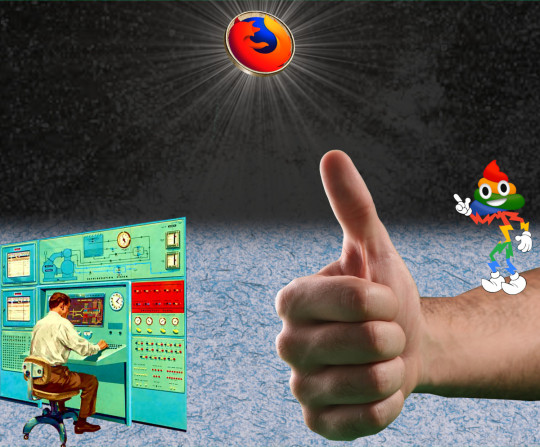
I'm coming to BURNING MAN! On TUESDAY (Aug 27) at 1PM, I'm giving a talk called "DISENSHITTIFY OR DIE!" at PALENQUE NORTE (7&E). On WEDNESDAY (Aug 28) at NOON, I'm doing a "Talking Caterpillar" Q&A at LIMINAL LABS (830&C).

It's official: the DOJ has won its case, and Google is a convicted monopolist. Over the next six months, we're gonna move into the "remedy" phase, where we figure out what the court is going to order Google to do to address its illegal monopoly power:
https://pluralistic.net/2024/08/07/revealed-preferences/#extinguish-v-improve
That's just the beginning, of course. Even if the court orders some big, muscular remedies, we can expect Google to appeal (they've already said they would) and that could drag out the case for years. But that can be a feature, not a bug: a years-long appeal will see Google on its very best behavior, with massive, attendant culture changes inside the company. A Google that's fighting for its life in the appeals court isn't going to be the kind of company that promotes a guy whose strategy for increasing revenue is to make Google Search deliberately worse, so that you will have to do more searches (and see more ads) to get the info you're seeking:
https://pluralistic.net/2024/04/24/naming-names/#prabhakar-raghavan
It's hard to overstate how much good stuff can emerge from a company that's mired itself in antitrust hell with extended appeals. In 1982, IBM wriggled off the antitrust hook after a 12-year fight that completely transformed the company's approach to business. After more than a decade of being micromanaged by lawyers who wanted to be sure that the company didn't screw up its appeal and anger antitrust enforcers, IBM's executives were totally transformed. When the company made its first PC, it decided to use commodity components (meaning anyone could build a similar PC by buying the same parts), and to buy its OS from an outside vendor called Micros-Soft (meaning competing PCs could use the same OS), and it turned a blind eye to the company that cloned the PC ROM, enabling companies like Dell, Compaq and Gateway to enter the market with "PC clones" that cost less and did more than the official IBM PC:
https://www.eff.org/deeplinks/2019/08/ibm-pc-compatible-how-adversarial-interoperability-saved-pcs-monopolization
The big question, of course, is whether the court will order Google to break up, say, by selling off Android, its ad-tech stack, and Chrome. That's a question I'll address on another day. For today, I want to think about how to de-monopolize browsers, the key portal to the internet. The world has two extremely dominant browsers, Safari and Chrome, and each of them are owned by an operating system vendor that pre-installs their own browser on their devices and pre-selects them as the default.
Defaults matter. That's a huge part of Judge Mehta's finding in the Google case, where the court saw evidence from Google's own internal research suggesting that people rarely change defaults, meaning that whatever the gadget does out of the box it will likely do forever. This puts a lie to Google's longstanding defense of its monopoly power: "choice is just a click away." Sure, it's just a click away – a click, you're pretty sure no one is ever going to make.
This means that any remedy to Google's browser dominance is going to involve a lot of wrangling about defaults. That's not a new wrangle, either. For many years, regulators and tech companies have tinkered with "choice screens" that were nominally designed to encourage users to try out different browsers and brake the inertia of the big two browsers that came bundled with OSes.
These choice screens have a mixed record. Google's 2019 Android setup choice screen for the European Mobile Application Distribution Agreement somehow managed to result in the vast majority of users sticking with Chrome. Microsoft had a similar experience in 2010 with BrowserChoice.eu, its response to the EU's 2000s-era antitrust action:
https://en.wikipedia.org/wiki/BrowserChoice.eu
Does this mean that choice screens don't work? Maybe. The idea of choice screens comes to us from the "choice architecture" world of "nudging," a technocratic pseudoscience that grew to prominence by offering the promise that regulators could make big changes without having to do any real regulating:
https://verfassungsblog.de/nudging-after-the-replication-crisis/
Nudge research is mired in the "replication crisis" (where foundational research findings turn out to be nonreplicable, due to bad research methodology, sloppy analysis, etc) and nudge researchers keep getting caught committing academic fraud:
https://www.ft.com/content/846cc7a5-12ee-4a44-830e-11ad00f224f9
When the first nudgers were caught committing fraud, more than a decade ago, they were assumed to be outliers in an otherwise honest and exciting field:
https://www.npr.org/2016/10/01/496093672/power-poses-co-author-i-do-not-believe-the-effects-are-real
Today, it's hard to find much to salvage from the field. To the extent the field is taken seriously today, it's often due to its critics repeating the claims of its boosters, a process Lee Vinsel calls "criti-hype":
https://sts-news.medium.com/youre-doing-it-wrong-notes-on-criticism-and-technology-hype-18b08b4307e5
For example, the term "dark patterns" lumps together really sneaky tactics with blunt acts of fraud. When you click an "opt out of cookies" button and get a screen that says "Success!" but which has a tiny little "confirm" button on it that you have to click to actually opt out, that's not a "dark pattern," it's just a scam:
https://pluralistic.net/2022/03/27/beware-of-the-leopard/#relentless
By ascribing widespread negative effects to subtle psychological manipulation ("dark patterns") rather than obvious and blatant fraud, we inadvertently elevate "nudging" to a real science, rather than a cult led by scammy fake scientists.
All this raises some empirical questions about choice screens: do they work (in the sense of getting people to break away from defaults), and if so, what's the best way to make them work?
This is an area with a pretty good literature, as it turns out, thanks in part due to some natural experiments, like when Russia forced Google to offer choice screens for Android in 2017, but didn't let Google design that screen. The Russian policy produced a significant switch away from Google's own apps to Russian versions, primarily made by Yandex:
https://cepr.org/publications/dp17779
In 2023, Mozilla Research published a detailed study in which 12,000 people from Germany, Spain and Poland set up simulated mobile and desktop devices with different kinds of choice screens, a project spurred on by the EU's Digital Markets Act, which is going to mandate choice screens starting this year:
https://research.mozilla.org/browser-competition/choicescreen/
I'm spending this week reviewing choice screen literature, and I've just read the Mozilla paper, which I found very interesting, albeit limited. The biggest limitation is that the researchers are getting users to simulate setting up a new device and then asking them how satisfied they are with the experience. That's certainly a question worth researching, but a far more important question is "How do users feel about the setup choices they made later, after living with them on the devices they use every day?" Unfortunately, that's a much more expensive and difficult question to answer, and beyond the scope of this paper.
With that limitation in mind, I'm going to break down the paper's findings here and draw some conclusions about what we should be looking for in any kind of choice screen remedy that comes out of the DOJ antitrust victory over Google.
The first thing note is that people report liking choice screens. When users get to choose their browsers, they expect to be happy with that choice; by contrast, users are skeptical that they'll like the default browser the vendor chose for them. Users don't consider choice screens to be burdensome, and adding a choice screen doesn't appreciably increase setup time.
There are some nuances to this. Users like choice screens during device setup but they don't like choice screens that pop up the first time they use a browser. That makes total sense: "choosing a browser" is colorably part of the "setting up your gadget" task. By contrast, the first time you open a browser on a new device, it's probably to get something else done (e.g. look up how to install a piece of software you used on your old device) and being interrupted with a choice screen at that moment is an unwelcome interruption. This is the psychology behind those obnoxious cookie-consent pop-ups that website bombard you with when you first visit them: you've clicked to that website because you need something it has, and being stuck with a privacy opt-out screen at that moment is predictably frustrating (which is why companies do it, and also why the DMA is going to punish companies that do).
The researchers experimented with different kinds of choice screens, varying the number of browsers on offer and the amount of information given on each. Again, users report that they prefer more choices and more information, and indeed, more choice and more info is correlated with choosing indie, non-default browsers, but this effect size is small (<10%), and no matter what kind of choice screen users get, most of them come away from the experience without absorbing any knowledge about indie browsers.
The order in which browsers are presented has a much larger effect than how many browsers or how much detail is present. People say they want lots of choices, but they usually choose one of the first four options. That said, users who get choice screens say it changes which browser they'd choose as a default.
Some of these contradictions appear to stem from users' fuzziness on what "default browser" means. For an OS vendor, "default browser" is the browser that pops up when you click a link in an email or social media. For most users, "default browser" means "the browser pinned to my home screen."
Where does all this leave us? I think it cashes out to this: choice screens will probably make a appreciable, but not massive, difference in browser dominance. They're cheap to implement, have no major downsides, and are easy to monitor. Choice screens might be needed to address Chrome's dominance even if the court orders Google to break off Chrome and stand it up as a separate business (we don't want any browser monopolies, even if they're not owned by a search monopolist!). So yeah, we should probably make a lot of noise to the effect that the court should order a choice screen, as part of a remedy.
That choice screen should be presented during device setup, with the choices presented in random order – with this caveat: Chrome should never appear in the top four choices.
All of that would help address the browser duopoly, even if it doesn't solve it. I would love to see more market-share for Firefox, which is the browser I've used every day for more than a decade, on my laptop and my phone. Of course, Mozilla has a role to play here. The company says it's going to refocus on browser quality, at the expense of the various side-hustles it's tried, which have ranged from uninteresting to catastrophically flawed:
https://www.fastcompany.com/91167564/mozilla-wants-you-to-love-firefox-again
For example, there was the tool to automatically remove your information from scummy data brokers, that they outsourced to a scummy data-broker:
https://www.theverge.com/2024/3/22/24109116/mozilla-ends-onerep-data-removal-partnership
And there's the "Privacy Preserving Attribution" tracking system that helps advertisers target you with surveillance advertising (in a way that's less invasive than existing techniques). Mozilla rolled this into Firefox on an opt out basis, and made opting out absurdly complicated, suggesting that it knew that it was imposing something on its users that they wouldn't freely choose:
https://blog.privacyguides.org/2024/07/14/mozilla-disappoints-us-yet-again-2/
They've been committing these kinds of unforced errors for more than a decade, seeking some kind of balance between monopolistic web companies and its users' desire to have a browser that protects them from invasive and unfair practices:
https://www.theguardian.com/technology/2014/may/14/firefox-closed-source-drm-video-browser-cory-doctorow
These compromises represent the fallacy that Mozilla's future depends on keeping bullying entertainment companies and Big Tech happy, so it can go on serving its users. At the same time, these compromises have alienated Mozilla's core users, the technical people who were its fiercest evangelists. Those core users are the authority on technical questions for the normies in their life, and they know exactly how cursed it is for Moz to be making these awful compromises.
Moz has hemorrhaged users over the past decade, meaning they have even less leverage over the corporations demanding that they make more compromises. This sets up a doom loop: make a bad compromise, lose users, become more vulnerable to demands for even worse compromises. "This capitulation puts us in a great position to make a stand in some hypothetical future where we don't instantly capitulate again" is a pretty unconvincing proposition.
After the past decade's heartbreaks, seeing Moz under new leadership makes me cautiously hopeful. Like I say, I am dependent on Firefox and want an independent, principled browser vendor that sees their role as producing a "user agent" that is faithful to its users' interests above all else:
https://pluralistic.net/2024/05/07/treacherous-computing/#rewilding-the-internet
Of course, Moz depends on Google's payment for default search placement for 90% of its revenue. If Google can't pay for this in the future, the org is going to have to find another source of revenue. Perhaps that will be the EU, or foundations, or users. In any of these cases, the org will find it much easier to raise funds if it is standing up for its users – not compromising on their interests.

Community voting for SXSW is live! If you wanna hear RIDA QADRI and me talk about how GIG WORKERS can DISENSHITTIFY their jobs with INTEROPERABILITY, VOTE FOR THIS ONE!

If you'd like an essay-formatted version of this post to read or share, here's a link to it on pluralistic.net, my surveillance-free, ad-free, tracker-free blog:
https://pluralistic.net/2024/08/12/defaults-matter/#make-up-your-mind-already

Image: ICMA Photos (modified) https://www.flickr.com/photos/icma/3635981474/
CC BY-SA 2.0 https://creativecommons.org/licenses/by-sa/2.0/
#pluralistic#choice screens#dma#eu#scholarship#ux#behavioral economics#mozilla#remedies#browsers#mobile#defaults matter#google#doj v google
204 notes
·
View notes
Text
i wonder if the denizens being simultaneously web browsers and eternal gods who exist simultaneously across realities is supposed to imply that skaia's "well of potential from which every conceivable possibility arises" in some way IS the internet
#and/or is the name 'browser' supposed to imply something about the 'choices' the heroes are supposed to take#like a denizen is a browser of timelines or something.
147 notes
·
View notes
Text
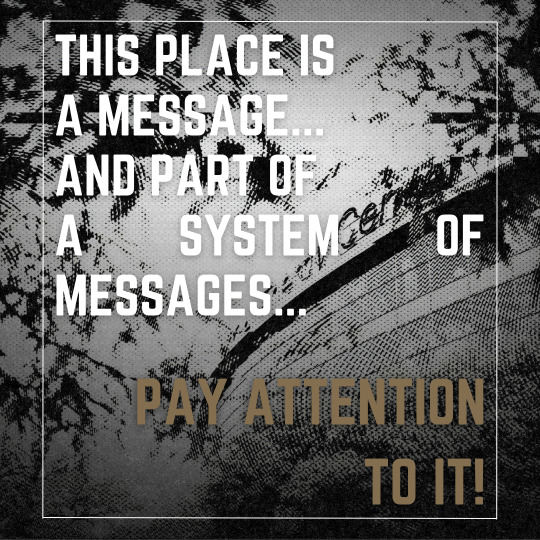
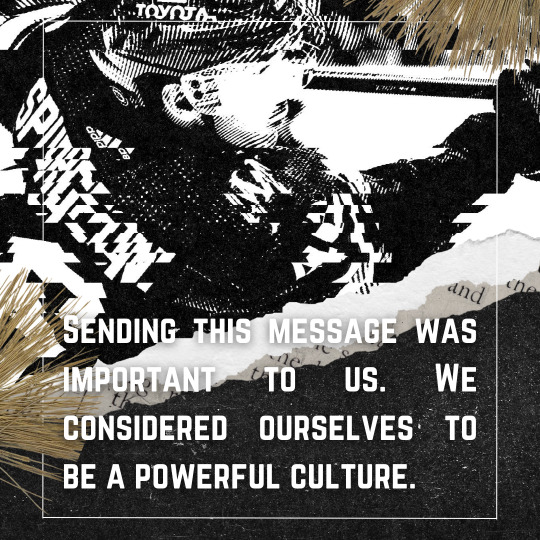
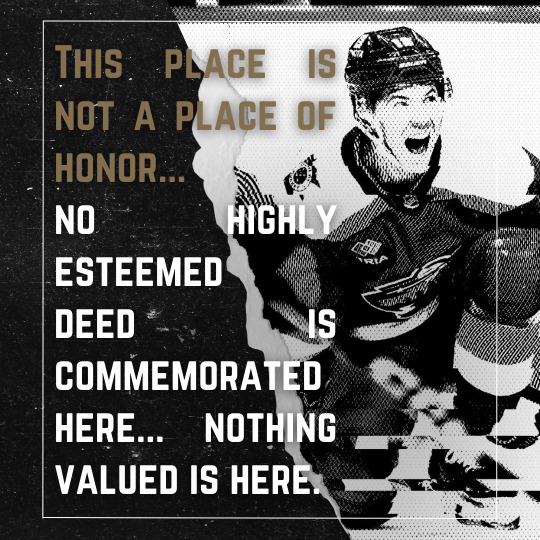






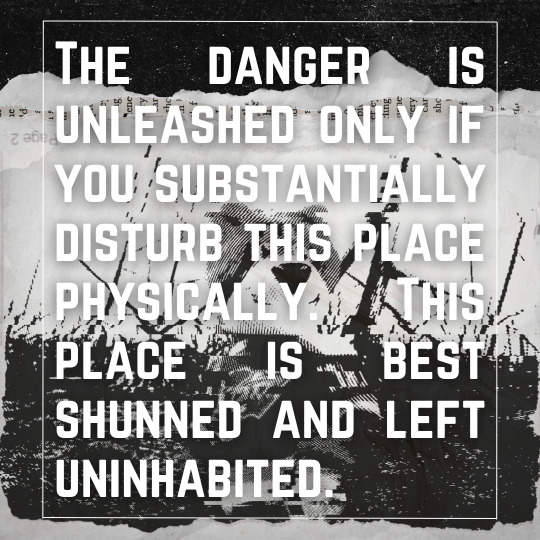
something man-made is here & it is dangerous (long-term nuclear waste warning messages but make it wild)
#google search is it possible to gatekeep a sports team#don't look at us don't talk about us don't even think about us <3 happy playoffs 2025#this has been haunting me since october when everyone was talking about the wild a ton. stop talking about us we're a nuclear waste reposit#anyway everyone say goodbye to 100+ tabs in my browser I'm sick & tired of looking at these#hello universities that have online digitized herbariums. my best friends. the plant choices were very intentional inquire within#minnesota wild#my.edit
33 notes
·
View notes
Text
Adrien might not get your references, but he will periodically send you every clean vine compilation on the list that he has accumulated over the past 10 years
#he has no idea what is going on in the world#it drives Alya crazy#and Marinette all like: ‘heehee 😍 isn’t he so out of touch 🥰😘💕’#Adrien had security blocks over his internet browser as a child#and I think that explains his video choices#it was one of those really weird parent control services#that blocks random things like Greek plays and videos about turtles or something idk#adrien agreste#miraculous ladybug#mlb#miraculous#ml
24 notes
·
View notes
Text
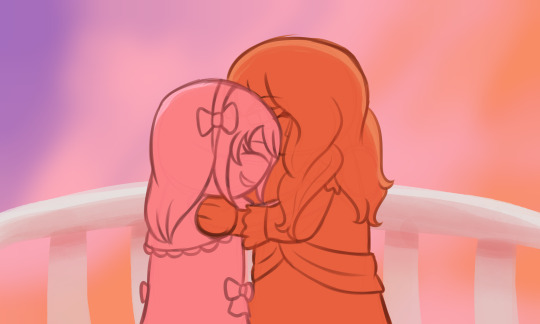
this is more or less just a messy sketch (my wrist hurts less, but it still hurts, I'm just on that "fuck up the wrist" grind ig) but I do kinda need something. I do want to leave my writing up to interpretation but being a not-app user gives me no other options than this...
This sketch was made to go with this fic, though not entirely, this is just my interpretation of my own writing and you do not have to take the same visual appearances. Especially since I made these up in like 2 seconds.
Tbh my pfp also kinda goes with it too. So I'll put that here

yeah.. Enjoy reading ig.
pleasedontfloppleasedontfloppleasedontfloppleasedon'tflop
#cap art!#cap writing#<-TUMBLR'S LINKS NOT WORKING ON BROWSER HAS LEFT ME NO CHOICES#fire emblem echoes#celica fire emblem#mae fire emblem
12 notes
·
View notes
Text
a nazi with autism is still a nazi
#safari is the best browser#safari posts#its not a topic of discussion#they make the choice to be what they are#however fucked your brain is doesnt decide for you
14 notes
·
View notes
Text
went to see if I can grab myself a bluesky but I guess they're only interested in new users who are willing to click a 'back' arrow once for every month they lived before November 2004? which 280ish is a lot so no thanks guess I'll continue to pass
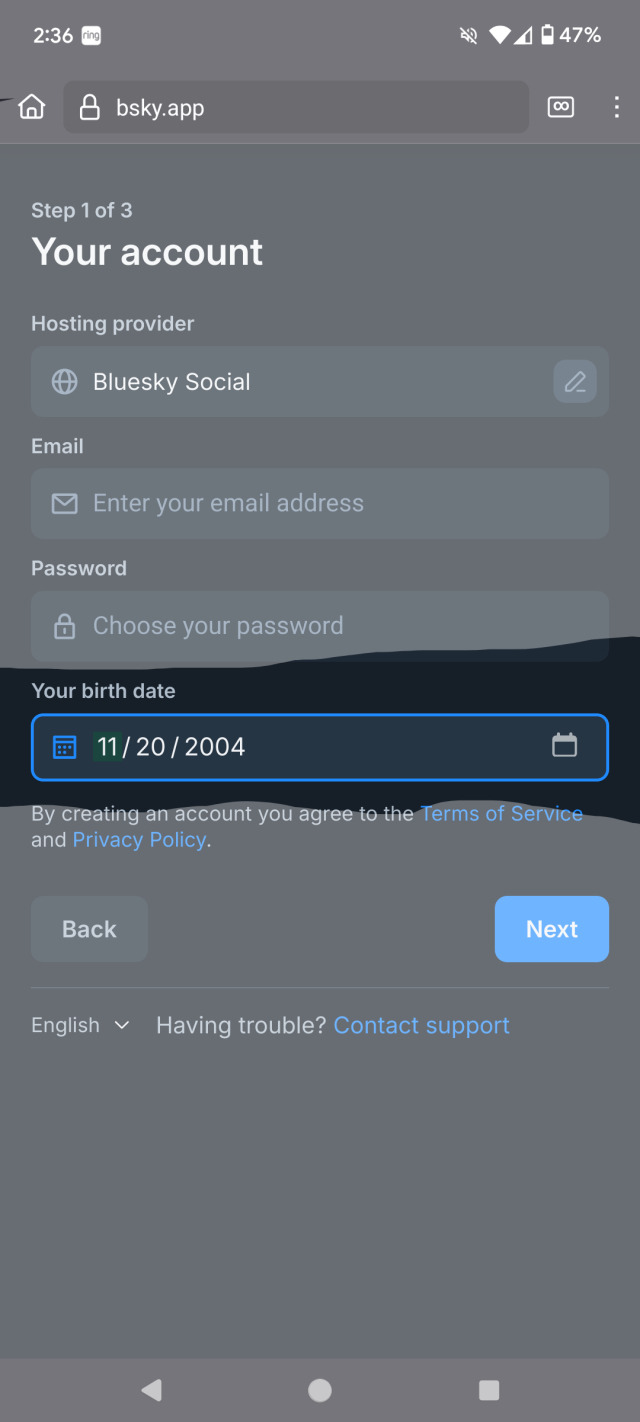
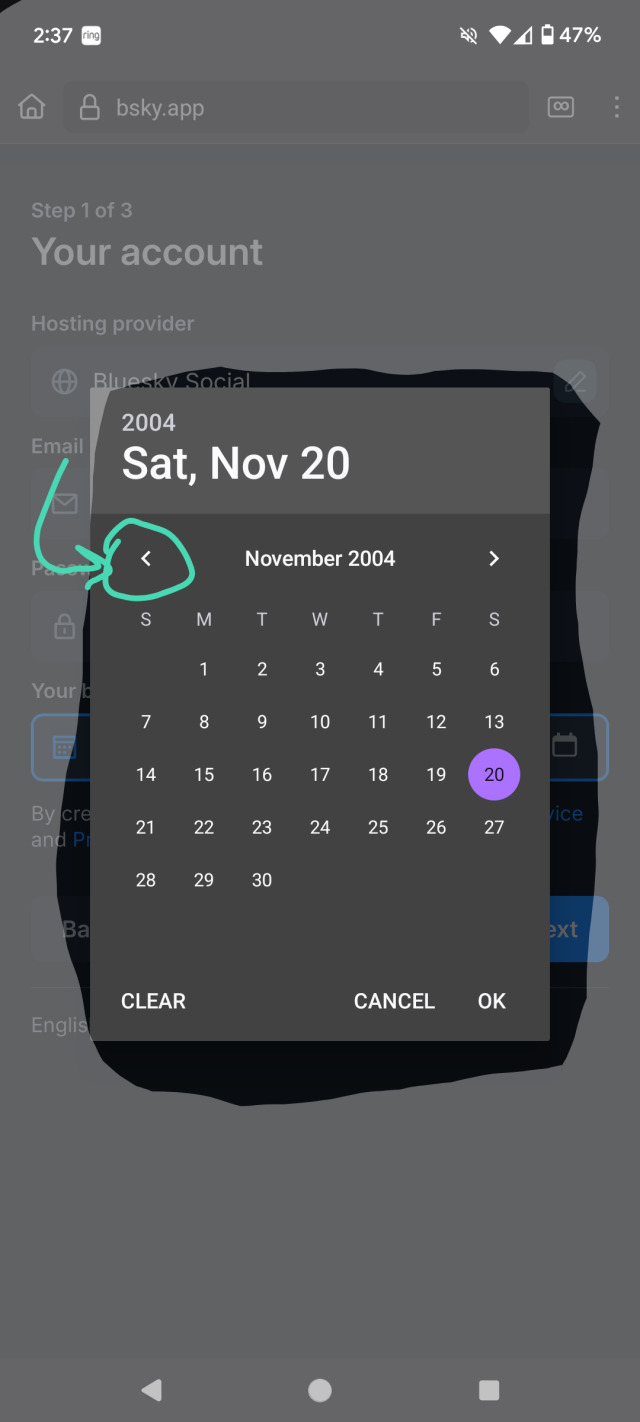
#ineffablefool original post#not good omens#if i thought this was a legitimate design choice I'd be offended not just as an old person but because it's just terrible ux#someone just slapped the wrong date control on the page though probably and the right one would let you jump by years/decades/etc#they'll fix it eventually (or it's just crap for mobile browser users because obviously if I'm on my phone it means I want Yet Another App)#(in which case either it happens to change in their next redesign or i maybe someday think to try while on desktop)
17 notes
·
View notes
Note
Hello! As promised, I am here to annoy you with positive vibes and good blessings! Thank you for being here and being a part of the Käärijä fandom. You are loved! Pass this on if you want to bless someone else's day! Stay beautiful 💜💚🖤

Aww man this is the cutest gif and one of my favourite looks, i wish he'd wear a scarf more often 🥰 Thank you and very same to you!! (also from my main 😌💚)

#made the shittiest gif known to man and proud of it XD#käärijä#vintage käärijä#whom i love dearly but this sure was a choice#(lmao looks like it's not even working in the browser. oh well.)
13 notes
·
View notes
Text
the tiktok ai on the slytherin skittles is... something
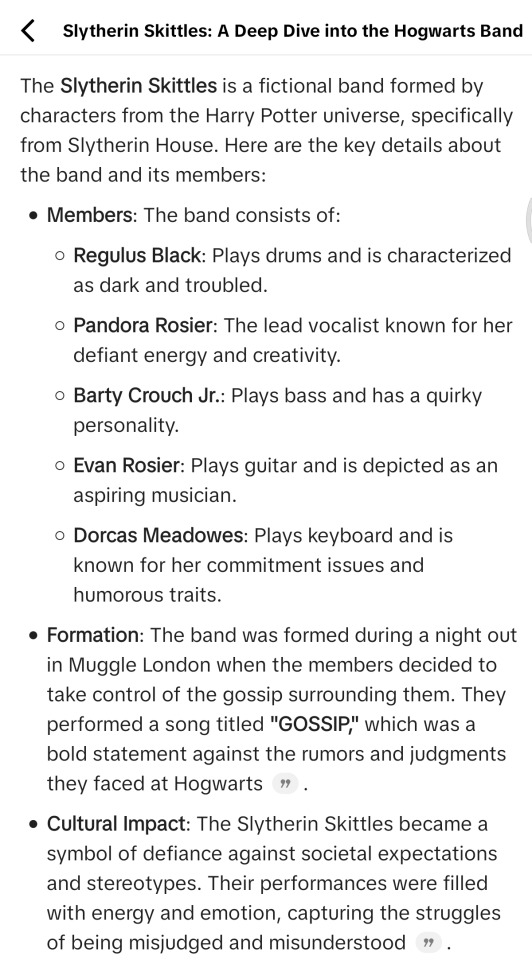
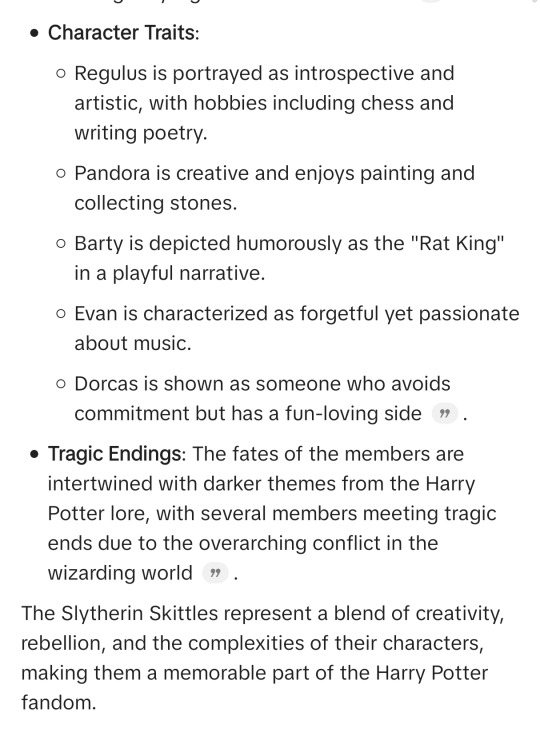
#I hate ai#literally why does everything have ai now days#if you want to know something just go to your browser of choice and type in the question#press enter and oh look there's a whole bunch of sources on the topic you just searched#slytherin skittles#regulus black#evan rosier#barty crouch jr#pandora rosier#dorcas meadowes#pandora lovegood#marauders era
13 notes
·
View notes
Text

staring wistfully at this thing from a past hallowmas. i wish i could see the full text and also why is the diatomist of all people representing the error of violence. let him go back home
#whoever gets me this text first i will. uh. draw you a character. its a voucher#i imagine hes tall but like. hes not even a dangerous companion#confessions of curiosity and whimsy make sense for him but violence is a choice!#my text#fallen london#the cloistered diatomist#tagging this as my. catnip. pspspsps. johnny is autistic about the browser game and needs more words
9 notes
·
View notes
Text
this is incomprehensible to anybody who isn't terminally and niche-ly online but james somerton looks like porfo from drawfee please help me

#I can't explain this to any of my friends please#this realization kicked me in the teeth and I can't recover#james somerton#porfo#drawfee#please somebody who is in these same two internet circles see this I need it#also I'm posting this from my mobile browser so if this is unreadable r.i.p. the Tumblr app won't run on my phone without crashing it#also also not trying to mock the guy for his physical appearance only for his style choices
55 notes
·
View notes
Text
Why is spotify so desperate to get back in my good graces? You are not my beloved bard, you are my wretched messanger boy, summoned only to tell me of my beloved mutuals Spotify playlists so that MY bard may play me their songs.
You lost any redeemable qualities in my court when you required a place in my court rather than a simple linked web. Remove yourself from my presence, and take your wretched ads with you.
#Not going back to the app that doesn't even play the songs oN THE PLAYLIST unless I give them money#Remove yourself from my view immediately#Pyxxie Rambles#Brought on by a random Spotify notification that I only say “come back to the music app that-” before I sent it away#Not a joke btw I used to copy friends/mutuals Spotify playlists onto my music app of choice#Then Spotify got uppity about using web browsers without signing in and also with ad blockers
6 notes
·
View notes
Text
Cats'll be like: Oh hey I see you're doing something important on the computer. That's a lovely mouse you have there. It'd be a real shame if someone were to forcefully bash their entire face into it as a sign of affection <uwu>
#brought to you by my goddamn menace of a cat#fucking up my dialog choices in da2#and clicking weird links in my browser#christ alive
23 notes
·
View notes
Text

And with that, The Doomed Scientist has completed his ambition!
Part of it, anyway. We're gonna have to wait for the epilogue. But oh, what an epilogue it will be. What an epilogue indeed.
As I said when I completed Heart's Desire- thank you all for following me on this adventure. And my condolences, as always, for clogging your Tumblr dashboards with Fallen London posting.
I'm not sorry. It will happen again.
I have a lot of thoughts on Nemesis as a whole and what this ending will mean for Caeru, but. Well. I'll save all of that for when he receives his reward. There's gonna be... a lot to unpack. Both in meta and RP terms.
And, of course, now that Nemesis is done...

...it's time to have a lark. And steal a very special diamond.
#when i picked up this game late one august afternoon i didnt think i'd ever get this far#much less have so many people genuinely interested in the weird little freaks i made up for it#thank you all. genuinely. cannot say that enough.#look at me getting dramatic over the finale of a browser game msq#yin-thoughts#fallen london#by ''i have a lot of thoughts'' i really do mean. soo many thoughts#this is gonna have repercussions for the scoundrel as well as (obviously) caeru himself#and caeru...#caeru. might take his ending of choice. just a little bit different than the average nemesis PC.#(i really need to write that post-nemesis fic now)#if ur wondering what ending he chose: i'll reveal that when he gets his treasure tomorrow. it feels more fitting that way#ooooor i guess you can go to his profile and read his journal bc i meticulously saved the entire ending sequence but shhh#that's cheating
18 notes
·
View notes
Text

btw this image gives me anxiety because the first time i reinstalled windows on my first laptop it was windows 7 with this image. and it didnt install internet drivers automatically so my parents had to call the internet guy and lets just say they were very upset about it
#tbh i didnt have a choice because i was trying to download cheats for digger online and managed to download a virus#a virus that turned every computer file into opera browser file#its also why i was afraid of this browser for ages until opera gx#everything i know about computers i got from fucking up badly
3 notes
·
View notes
Note
Greetings! I have a question.
In Ghost world, do Papa's wear a mask or is it their normal faces? Do you know what I mean? Did Copia actually have a botched surgery or everyone just accepts he changed his mask?
I’m not sure why this anon has chosen me as an authority/source of info on Ghost, but these answers are readily available with a Google search; and honestly the constant spamming of my inbox with questions like these is making me uncomfortable. I answered a couple but TBH I’m not having such a great time mentally, of late, so please, check the various resources online for info like this. Thank you.
#foxy inboxy#I’m sorry for how this may come off but I’m pretty fragile right now#I’m having a Ghost fandom crisis in a way#please direct your question to your friendly browser of choice#please and thank you
2 notes
·
View notes